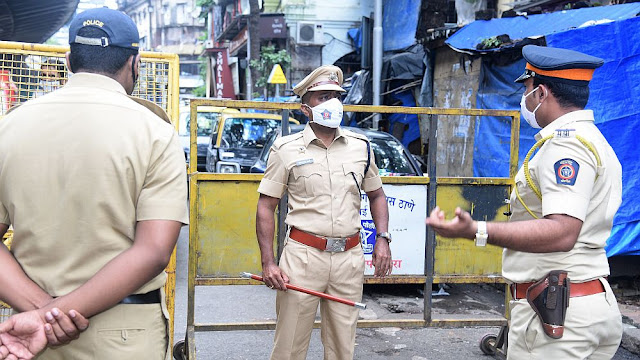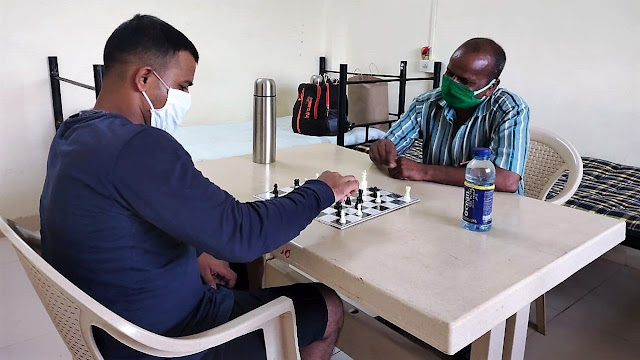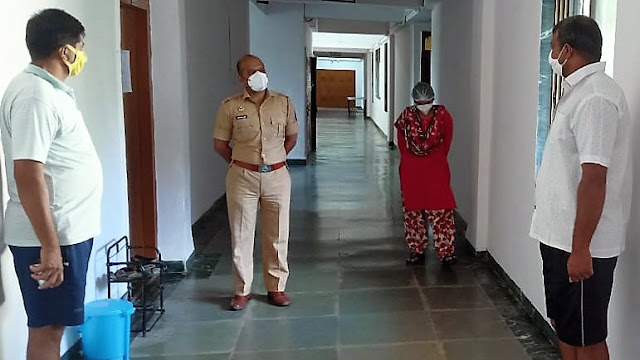At Risk On Ground Zero And...Fighting!
Mumbai has been one of the worst-affected cities across India registering more than two lakh COVID-positive cases, till date. Other than medical personnel working closely with those affected and risking life, it was the police and particularly so, the traffic police which was on the forefront, on Ground Zero, interacting with restless commuters and locals frustrated with staying indoors for days on end. With the city reopening in phases over the last few months, the crowds have been surging consistently.
In an interview with Manu Shrivastava, Mumbai Deputy Commissioner of Police (Traffic-South) Somnath Gharge revealed all about manning the city that never sleeps, tackling the difficulties faced by his force and… overcoming them! Here go excerpts:
The Draft: Considering the uniqueness of the situation, how did Mumbai’s traffic police handle the COVID-19 crisis?
Somnath Gharge: The lockdown situation was completely new for all of us. We had to ensure that the constantly changing guidelines were implemented in the strictest manner. Why, even what comprised ‘essential service’ or ‘emergency service’ and which vehicles were permitted on the road and which weren’t, kept changing regularly.
 |
| Mumbai Deputy Commissioner of Police (Traffic-South) Somnath Gharge |
During the nakabandi, the traffic constables and naiks were at high risk as they worked on Ground Zero. In the initial days of the lockdown, many of them got infected as, in the line of duty, they had to check for travel permissions or ascertain identities and in the process of handling paperwork, came too close for comfort, thereby contracting the virus themselves.
Once we realised the problem, we issued advisories, especially to those stationed at nakabandi, to stop apprehending vehicles and maintain safe distances.
Besides the obvious threat of contracting COVID-19, what were the other issues that your staff had to tackle?
Oh, there were a string of problems that they took in their stride. The sheer nature of their job demands ‘close’ interaction with members of the public. And, with people breaking the rules of curfew, the risk of handling only increased.
In the absence of public transportation, my staff living far would have to ride their two-wheelers to commute. So, after twelve hours of duty, they’d have to ride back home to places as far as Badlapur and then leave for work early next morning again. It was a test of stamina and patience for them all. To keep their families safe, many chose to stay back at their respective police chowkies for days on end.
 |
| DCP Gharge at work with colleagues manning a barricaded zone in COVID-hit Mumbai |
For almost two months after the lockdown was announced, the availability of food was a huge issue. As most personnel left very early from homes, they were unable to bring food with them. And with restaurants shut, they’d face a lot of problems.
Also, most of my working staff was heavily overworked. With every chowky functioning at sub-optimal capacity, as approx. 20 per cent staff in each was relieved as they were older or suffered some co-morbidity, things were getting really tough for the rest who were over-burdened. Many couldn’t even manage their weekly offs.
There were a lot of practical problems even to maintain hygiene, such as a real inability to wash uniforms daily as most personnel had limited sets, difficulty in maintaining social distancing ‘within’ the chowkies, etc. Later, we made arrangements for them to stay in hotels.
I recall the case of a colleague who, like many others, wanted to leave his family back to the village so he could focus on work in peace. But, when he arrived at the village, fearing COVID-19, the locals denied him entry and he had to return immediately with his family. Not only did he have to bear the financial cost of the hired vehicle but also slipped into depression owing to the incident. We had to counsel and comfort him.
You held the additional charge of the dedicated COVID-19 Care Centre (CCC) in Marol, exclusively for police personnel. How was the experience?
The facility at Marol, dedicated for SARS-COV-2 infected patients of Mumbai Police, was functional from 21 May 2020 to 12 August 2020. This was created to tackle the surge in the number of COVID-19 positive cases and the concurrent shortage of beds. During this period, more than 1,100 patients with mild symptoms were admitted. Patients with severe symptoms were taken to hospitals with ICU facilities.
 |
| DCP Gharge taking a stock of things at the Covid Care Centre (CCC) in Marol |
We had to run it like a hospital where patients stayed for eight to 15 days on an average. If a patient got critical, then s/he would be shifted to a hospital.
It must have been quite an experience watching the inmates recover. What were the challenges you faced?
Those admitted to CCC had to be kept mentally engaged just so they stay positive. I introduced indoor games such as chess and ensured entertainment through a music system, books, etc.
 |
| COVID-infected police personnel admitted at the Marol CCC playing chess |
In some cases, the entire family of a policeman was admitted to the CCC. It could be his wife, children and parents who got infected along with him. At a time, there were easily 200-250 patients admitted in the facility. We also introduced recreational activities such as yoga classes, etc.
I remember there was one particular patient, a 90-year-old ex-policeman who specifically insisted he wanted to stay at our facility and not be shifted to a hospital, despite the fears over his age. He stayed for ten days, recovered fully and left.
 |
| DCP Gharge interacting with inmates at the CCC in Marol |
There were problems too. For example, the food made in the mess for the patients had to be hygienic and nutritious. Many cooks who came for the job, ran away after learning it was a COVID Care Centre. We had to literally cajole cooks to stay back and work. This also included women volunteers to make chapatis for the patients.
Considering the imminent threat of contracting the virus yourself, at work, how did your family react to your work responsibilities, particularly at the CCC?
My wife Vaishali and son Prithviraj were extremely worried for me in the initial period from April till June. It was a completely new situation, and no one knew what to expect so the fears were understandable.
I would tell them how my subordinates were committed to duty despite staying far and working in much more difficult circumstances. I’d tell them how when I had been given an official vehicle to commute as opposed to their travelling on two-wheelers from such large distances, I had little reason to fear or complain.
The story first appeared in The Draft.




Post Comment